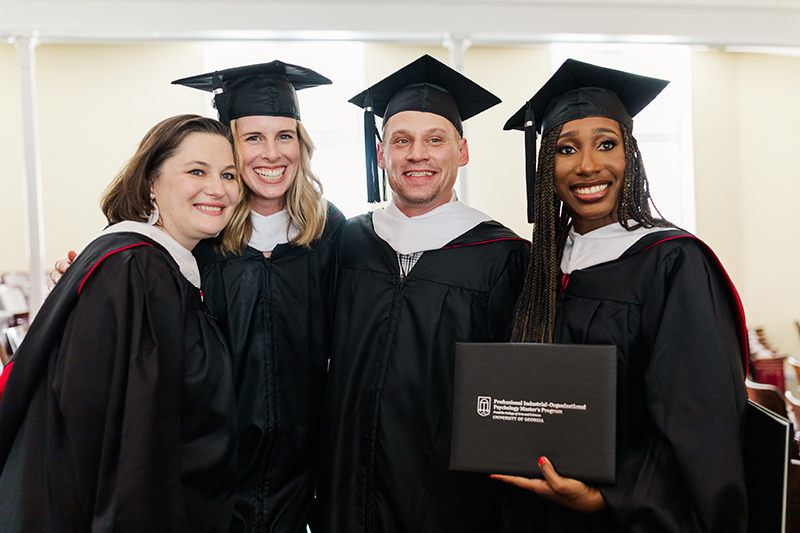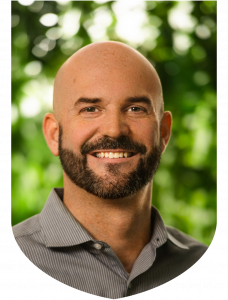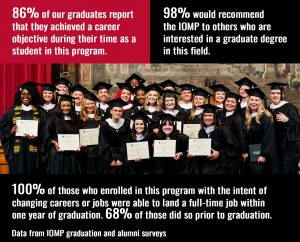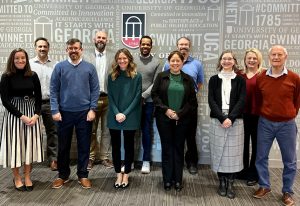
(photo courtesy of Dr. Brian Frost/IOMP)
The UGA Graduate School offers an array of graduate programs to enhance and support current working professionals. The Professional Master’s Program in Industrial-Organizational Psychology (IOMP) is one such program, designed for working professionals seeking to pursue graduate education in a collaborative, practitioner-focused format.
For an in-depth and first-hand exploration of the program, we turned to Dr. Brian Frost, Director and Faculty Member of the Professional I/O Psychology Master’s Program, to share his expertise.
 Faculty Perspective: Dr. Brian Frost
Faculty Perspective: Dr. Brian Frost
What is the scope of IOMP? What kind of training do the students receive?
This is a two-year program designed to enable those who work full-time to continue to do so while earning a graduate degree from the University of Georgia and from one of the most respected I/O Psychology graduate programs in the world.
It also enables working professionals across Georgia and across the United States to have access to a high-quality graduate education without having to move to Athens. These students drive and fly into Atlanta from out-of-state to attend our weekend sessions. We have had students who live in Florida, Alabama, Tennessee, South and North Carolina, Pennsylvania, Michigan, and even California complete this program.
Industrial and Organizational Psychology is the study of human behavior in the workplace. We train students to appropriately interpret and apply existing research evidence as well as to properly apply the scientific method and leverage advanced statistical analysis to conduct their own research to diagnose organizations. Ultimately, as practitioners, they then leverage this knowledge to design and implement evidence-based solutions for organizations that address the root causes of talent issues related to individual, team, and organizational performance, turnover, and well-being.
Our students complete courses in statistics, research methods, psychological assessment, talent acquisition, training, leadership development, competency modeling, motivation, diversity and inclusion, and organizational change.
Read more about the curriculum and student experience.
What are some of the program’s goals and objectives?
- To hone speaking and writing skills so that graduates can effectively influence business leaders and organizational stakeholders to make changes that we know are likely to improve the lives of people at work and enhance the overall performance of the organization.
- To enable students to develop life-long, collaborative relationships with their fellow students and faculty.
- To expose students to as many challenging situations and experienced I/O practitioners as possible to learn from their successes and failures and develop that wisdom before they get into the driver’s seat.
- To give them a toolbox of resources that they can reference and leverage for the rest of their careers.
- To provide them with skills and best practice approaches that they can immediately apply to improving their current organizations throughout their time in the program.

See a list of where our graduates have been hired: psyc.franklin.uga.edu/why-iomp
What benefits do you see for students who complete the program?
- This is a lucrative field that remains in high demand. In 2023, U.S. News & World Report ranked I-O Psychologist as the #1 Best Science Job, the #13 Best Paying Job Overall, and the #22 Overall in their 100 Best Jobs list., and the UGA I-O brand is highly respected and valued by hiring managers in this field.
- Build a massive network. We have over 160 alums from this program already. The UGA I/O PhD program has existed for over 50 years. There are hundreds of alums from the I/O PhD program who work as practitioners and who are in leadership roles in organizations. They bring plenty of job openings to us.
- The practical skills. A series of studies of I-O Master’s programs published in 2018 by the Society for Industrial and Organizational Psychology (SIOP) ranked UGA’s IOMP among the top in the nation out of 157 Master’s programs affiliated with SIOP. These rankings highlight the applied focus of our program and the ability of our alums to provide immediate value to organizations relative to other I-O Master’s programs. The UGA I/O brand is extremely strong.
- Perform more meaningful work. Many working professionals who enter this program have had experiences which may have been positive or negative in their jobs that made them realize the importance of how people are treated by their organization and the impact this has on individual, team, and organizational performance and well-being. Whether it be related to the design of their job, interactions with their coworkers or their bosses, or the processes, structure, or culture of the organization, these folks are driven to this field to be able to learn and apply evidence-based best practices for improving the lives of people at work.
When a student tells me that this program changed their life (and I’ve been told that more than a few times), you can’t put a price on that. It’s one of the main reasons why I decided to take this role and build this program.
What about this program enables working professionals to pursue this degree?
Our culture and our climate make the difference. A critical component to this program’s success is continually emphasizing flexibility and support. We provide flexibility with deadlines throughout the program when major life events come up or when their full-time work demands or family demands exceed their capacity.
Most graduate programs from on-ground institutions require someone to reduce work to part-time to be able to attend classes. Most experienced professionals have financial or family commitments, such as a mortgage, car payments, children, or aging parents, where they cannot afford to do that. We have had working professional students from sales, marketing, engineering, law, project management, and elementary and secondary education, among others, who have successfully changed careers as a result of this program.
The design of this program and the supportive, flexible approach in delivering it enables those professionals to make that career change, get the in-person classroom experience, develop close relationships with other students and faculty, and earn a degree from a reputable, on-ground institution.
More importantly though, we are proactively supportive. I emphasize that in orientation and reinforce it as best I can in every interaction with students and faculty throughout the year. We want our students to succeed. We want our students to work together to help each other succeed, not to compete with each other as it might happen in Law School or an MBA program, where students are ranked. They already have enough stress in their lives with full-time work, full-time school, and many caring for either children or older parents.
The field of I/O Psychology is highly collaborative. We are all working toward the same purpose, to improve the lives of people at work and ultimately that should improve their lives beyond the workplace as well. Our students have ranged in age from 23 to 62 with an average of roughly 30 years old. We have many students in their 30’s, 40’s, and 50’s. Major life events happen a lot at those ages. I tell the students that they will almost all, at some point in their two years here, need to lean on each other to succeed in this program.
The cohort model is essential to that. Our students only begin in the Fall semester, and they join a cohort of 20 to 25 students. They all progress through their courses together and ultimately graduate together. The cohorts become very tight. They also support each other across cohorts. About five years ago, a cohort that had just graduated decided to give a gift to the incoming cohort on their first day in class. That gesture has now been repeated every year as a sort of “pay it forward” situation. That has blossomed into first-year cohorts hosting outings for second-year cohorts to celebrate their impending graduation. It has just been amazing to watch the love and support cascade across cohorts.

IOMP Faculty (photo courtesy of Dr. Beth Duggan/IOMP Graduate)
What else makes the IOMP at UGA unique?
- Half of the courses in this program are taught by talented, experienced practitioners from Atlanta area businesses and consulting firms. This includes HR executives, managing consultants, and independent business owners. I don’t know of another program in this field, or any field really, that can boast that. The other courses are taught by academic faculty. It creates a powerful balance to the learning experience.
- The diversity of our students and faculty, not just in race, gender, and age but in academic and employment backgrounds. Around half of our students were Psychology majors in undergraduate. The rest come from any major. We have had students from Biology, MIS, Classical Languages, English, Journalism, Engineering, International Affairs, Risk Management, Political Science, Philosophy, Finance, Biblical Studies, you name it. We have had many students with graduate degrees in other fields, including 3 PhDs, 4 lawyers, and Dr. Beth Duggan, our M.D. Same with the employment backgrounds of our students. Our students have worked in Operations, Safety, Quality Control, Finance, HR, Logistics, and they have come from small start-ups and boutique firms as well as Fortune 500 organizations. We have had several iconic organizations around Atlanta represented, such as Chick-Fil-A, Coca Cola, Cox Communications, The Home Depot, Georgia Power, Georgia Tech, UGA, and Emory University. This creates a unique learning experience in the classroom, where students share how the concepts we cover in the course have been applied effectively or ineffectively in their current or past organization. It enables the sharing of best practices across organizations and a first-hand understanding of how the application of the learning always depends on the factors specific to each situation.
- The program was designed and is run by (me) someone with 12 years of full-time consulting experience in this field who has worked as an internal consultant for a large organization, Home Depot, and as an external consultant for a small boutique consulting firm, a global technology consulting firm, and a Fortune 50 company, IBM. I have seen what skills and knowledge are needed to be effective. I know what was taught in graduate school in this field that was useful as a practitioner and what was taught that was not useful, and even counterproductive.One example of something taught in traditional graduate programs that is counterproductive as a practitioner is writing skills. In highly academic programs, like R1 PhD programs, we are taught to write for publishing. We write at length, and we use terms that are not understood by most people. Academics (and their graduate students) write for other academics, not for the audiences we, as practitioners, are ultimately trying to influence. So, we don’t train that approach in our program. We train the opposite. Know your audience. Explain it in their terms, give them solutions, and do it quickly. Otherwise, you will have no influence on them and ultimately be ineffective as a practitioner. We put word limits on papers and essays rather than word minimums. Students are required to compose a 4-to-6-page white paper instead of a traditional 50+ page thesis in order to graduate. While 4 to 6 pages sounds easy, I can promise it is not an easy process to succinctly demonstrate one’s expertise on a topic, describe research evidence in laymen’s terms, and generate specific action steps that provide sufficient value to the intended audience, non-I/O business professionals.
Learn more about the I/O Psychology Master’s Program
